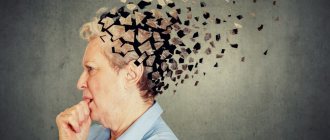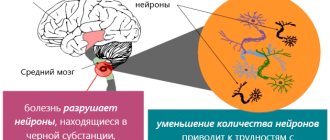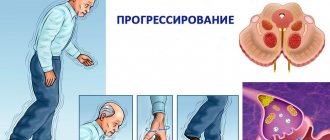Alzheimer's disease is a pathology with neurodegenerative disorders in the brain. As the disease progresses, patients' intellectual abilities deteriorate, memory is impaired, and self-care skills are lost. Naturally, patients and their families are primarily interested in the question: is there a cure for Alzheimer's disease? However, modern science cannot yet give a positive answer. Alzheimer's disease is treated with drugs that can only slow down the pathological process, but do not eliminate it completely. New drugs are constantly being developed to treat Alzheimer's, but they cannot yet completely eliminate the disease. The Yusupov Hospital uses the most modern methods of treating Alzheimer's disease, which normalize the patient's condition and improve his quality of life.
Symptoms of Alzheimer's disease
The disease most often occurs in old age. But its development can begin from 40 to 60 years. In most cases, I diagnose it when the signs of pathology have already become obvious, which significantly complicates the treatment of the disease and worsens the prognosis. This is due to the fact that the first signs of pathology are ignored, and in the meantime the disease progresses. The sooner medications for Alzheimer's disease are started, the greater the chance of maintaining the patient's mental clarity for a long time.
The first sign of developing Alzheimer's disease is memory loss. Typically, short-term memory suffers when the patient cannot remember recent events. At the same time, the events of bygone days are remembered very well.
Another sign of the disease is periodically inappropriate behavior of the patient. This can manifest itself as unreasonable aggression, increased irritability, and inappropriate fun. Human activity decreases and interest in the world around us disappears. A person has difficulty perceiving information, and speech impairment occurs.
As the disease progresses, the severity of clinical manifestations increases. It is recommended to start taking Alzheimer's medicine at an early stage to slow down neurodegenerative processes. Drugs for the treatment of Alzheimer's help stop the development of pathologies and improve the patient's condition.
Alzheimer's disease (AD) is one of the most common and severe diseases of late life. Although this disease has been known for more than 100 years, real steps towards studying its neurobiological basis and searching for methods of therapy began to be actively taken in the world only in the last quarter of the last century. Today, in economically developed countries, research in the field of asthma has become one of the priority areas in the development of medical science and healthcare.
In 2012, according to the Alzheimer's Association in the USA, 5.4 million patients with AD were recorded; this figure is expected to approach 16 million by 2050 [1]. An epidemiological population study conducted by employees of the Department for the Study of Alzheimer's Disease of the National Center for Clinical Prevention of the Russian Academy of Medical Sciences showed that 4.5% of the Moscow population aged 60 years and older suffer from AD [2].
In accordance with diagnostic guidelines developed by international expert groups, including NINCD-ADRDA (National Institute of Neurological and Communicative Diseases and Stroke-Alzheimer's Disease and Related Disorders Association) [3], and the International Classification of Diseases, 10th revision ( ICD-10) lifetime diagnosis of asthma is based on the following mandatory features:
1. Presence of dementia syndrome.
2. Development of multiple deficits in cognitive functions, which is determined by a combination of memory disorders with deterioration in memorizing new and/or reproduction of previously learned information and the presence of signs of at least one of the following cognitive impairments:
• aphasia (impaired speech function);
• apraxia (impaired ability to perform motor activity, despite intact motor functions);
• agnosia (inability to recognize or identify objects, despite intact sensory perception);
• violations of intellectual activity itself, i.e. planning and programming activities, abstraction, establishing cause-and-effect relationships, etc.
3. Impairments of both memory and cognitive functions must be expressed to such an extent that the patient’s social or professional adaptation is reduced.
4. The course is characterized by a gradual, subtle onset and steady progression of impairment of cognitive functions.
5. There are no data from clinical or special paraclinical studies that could indicate that memory and cognitive disorders are caused by any other disease or damage to the central nervous system (for example, cerebrovascular disease, Parkinson's or Pick's disease, Huntington's chorea, subdural hematoma, hydrocephalus, etc.), a systemic disease that is known to cause dementia syndrome (for example, hypothyroidism, vitamin B12 or folic acid deficiency, hypercalcemia, neurosyphilis, HIV infection, severe organ failure, etc.), or state of intoxication (including medication).
6. Signs of the listed cognitive impairments should be detected outside of states of stupefaction.
7. Anamnestic information and clinical study data exclude a connection between the detected cognitive dysfunctions and any other mental illness (for example, depression, schizophrenia, mental retardation, etc.).
The modern classification of asthma is based on age. In accordance with ICD-10, two forms are distinguished: early-onset AD, i.e. before 65 years of age (synonyms: type 2 AD, presenile dementia of the Alzheimer's type); AD with late onset, i.e. after 65 years (synonyms: type 1 AD, senile dementia of the Alzheimer’s type). In addition, a distinction is made between atypical asthma and mixed type dementia, i.e. a combination of manifestations characteristic of asthma and vascular dementia.
The course of the disease is traditionally divided into three main stages: mild, moderate and severe dementia. At the stage of “mild” dementia, memory impairments (especially for current events become obvious to others, patients have difficulties in chronological as well as geographic orientation. There are obvious difficulties in mental operations, especially in abstract thinking, the ability to generalize, judge, and compare. Patients can no longer independently carry out financial transactions, conduct correspondence, or travel, although they still retain the ability to self-care and relatively independent living.With presenile AD, impairments of higher cortical functions (speech, praxis, optical-spatial activity) already at the stage of “mild” dementia reach clear severity. Senile asthma, in contrast to the presenile type of the disease, debuts exclusively with amnestic disorders. The latter are most often combined with personality changes such as the so-called transindividual (senile) restructuring of the personality structure or the psychopathic type in the form of sharpening the patient’s characterological characteristics.
At the stage of moderately severe dementia, manifestations of amnestic syndrome predominate in combination with disorders of higher cortical functions characteristic of damage to the temporo-parietal parts of the brain, i.e. symptoms of dysmnesia, dysphasia, dyspraxia and dysgnosis. At this stage, pronounced memory disorders are observed, concerning both the possibility of acquiring new knowledge and remembering current events, and reproducing past knowledge and experience; orientation in time, and often in the environment, is grossly disrupted. Patients can no longer independently cope with any professional or social responsibilities. They only have access to simple routine housework, their interests are extremely limited, and they need constant support and assistance - even with self-care. Patients with the senile type of asthma are characterized by amnestic disorientation with the phenomenon of “shifting the situation into the past,” i.e., with a pathological revival of memories of the distant past and false recognition of others, whom patients mistake for people from their past. At the stage of severe dementia, the condition of patients (regardless of the type of disease) is characterized by total dementia with profound memory decay, complete fixation amnesia and amnestic disorientation close to total. The severity of the collapse of intellectual functions is such that patients almost completely lose the ability to make judgments and inferences, verbal communication, and lose psychomotor skills. They are not capable of independent existence and require constant care and supervision. Neurological symptoms reach their greatest severity. But in senile asthma, even at the initial stage, there are no severe neurological disorders (grasping and oral automatisms, amyostatic syndromes or hyperkinesis) characteristic of the final stage of presenile asthma. In patients with severe senile dementia, the final stage usually develops following the addition of some somatic pathology, most often pneumonia: against this background, cachexia, severe degenerative disorders, and fetal position quickly develop.
In the last decade, attempts have been made to purposefully influence both the already known links in the pathogenesis of the neurodegenerative process underlying AD, and the consequences of those dysfunctions that arise at the cellular and molecular levels during its development. This led to the development of the main directions of pathogenetic therapy for AD. The most well developed of them are compensatory (replacement) therapy aimed at overcoming neurotransmitter deficits in various neuronal systems that suffer to a greater or lesser extent in AD.
The main directions in the development of pharmacological methods for the treatment of AD are associated with attempts to correct cholinergic deficiency. Deficiency of the neurotransmitter acetylcholine (ACh) underlies cognitive failure and the subsequent formation of total dementia. The severity of cholinergic disorders correlates with the degree of dementia. Currently, acetylcholinesterase inhibitors (AChEIs) are mainly used to overcome cholinergic insufficiency. Representatives of the new generation of AChE inhibitors are rivastigmine, donepezil and galantamine. The therapeutic effects of these drugs, as well as the safety of their use in AD patients at the stage of mild and moderate dementia, have been convincingly demonstrated in numerous domestic and foreign clinical studies. One can note the dose-dependence of their action, as well as the greatest effectiveness for patients with relatively more intact higher mental functions. The recommended minimum duration of treatment is 6 months.
Rivastigmine is a centrally selective, pseudoreversible (slowly reversible) carbamate-type cholinesterase inhibitor with dual action. Rivastigmine inhibits both AChE and butyrylcholinesterase (BuChE) and has affinity for the cells of the hippocampus and cerebral cortex, i.e., those areas of the brain that are most involved in the pathological process in AD.
Already in the first clinical studies of rivastigmine, its positive effects and good tolerability were noted. In a large multicenter study that included 696 patients with mild and moderate asthma and lasted 26 weeks, significant positive dose-dependent effects of the drug (6–12 mg/day) on cognitive functions and general functioning were established [4]. A study by G. Grossberg et al. [5] showed that the effect of rivastigmine on cognitive function remained clinically significant for at least two years of continuous drug use. Analysis of pooled data (for a group of 2010 patients) showed significantly less deterioration in cognitive function in patients treated for 2 years with rivastigmine compared with patients receiving placebo. The differences at the end of the study were 4–5 points on the ADAS-cog scale. (Alzheimer's disease assessment scale). Similar data were obtained for the Global Clinical Rating Scale.
When using rivastigmine, there was an improvement in the performance of such daily activities as shopping for groceries and cooking, taking medications on time, using the telephone, household appliances, maintaining previous hobbies, etc. [6, 7]. In addition, SG Potkin et al. [8] were able to show that rivastigmine can improve the daily functioning of patients at any stage of the disease, but the greatest effect in this regard is observed at its moderate stage.
Donepezil, a piperidine derivative, is a highly specific, reversible inhibitor of central AChE. The drug has high bioavailability (100%). The effectiveness of donepezil was also confirmed in a multicenter, double-blind, placebo-controlled study of more than 900 patients with mild to moderate asthma, conducted over 24 weeks [9]. The use of the drug significantly improved the cognitive functions of patients. During treatment, the condition of the majority (80%) of patients receiving donepezil improved or remained at baseline. A similar therapeutic effect occurred in only 30% of patients in the control group receiving placebo.
A dosage of 10 mg/day of the drug has been shown to be more effective than 5 mg/day. The researchers noted that the drug's beneficial effects compared to placebo persisted for 6 weeks after completion of donepezil.
K. Rockwood et al. [10], who performed a multicenter, 52-week open-label study of patients with mild-to-moderate asthma, were able to identify targets for therapeutic intervention during donepezil treatment depending on the assessment made by the physician or caregiver. According to the clinician's assessment, the therapeutic targets of donepezil include cognitive function (85% of all patients), patient functionality (68%), behavioral disorders (57%), social interaction (52%) and leisure (20%). Caregivers rated functional activity (86%), cognition (83%), leisure (76%), behavior (57%), and social interaction (49%) as therapeutic targets.
A study of the effectiveness and safety of donepezil in the treatment of asthma was also carried out in Russia [11]. Based on the data obtained, the authors concluded that donepezil is a safe and effective treatment for AD at the stage of mild and moderate dementia. The clinical effectiveness of a 3-month course of treatment with donepezil was established using the MMSE (Mini-Mental State Examination) and ADAS-cog. cognitive scales, as well as based on the general clinical impression of the effect of therapy by the caregiver. The data obtained are in good agreement with international experience in the use of donepezil for the treatment of patients with asthma.
Galantamine is a cholinomimetic drug with a dual mechanism of action unique to AChE inhibitors. It enhances the effects of ACh not only through reversible inhibition of AChE, but also through modulation of nicotinic acetylcholine receptors [12].
In randomized studies performed to date, the effectiveness and safety of long-term (6 months) course therapy with galantamine was studied in cohorts of AD patients with mild and moderate dementia. These studies were carried out in Europe, Canada, Australia and South Africa, as well as in the USA [13, 14–16]. In all of the studies mentioned, galantamine showed a significant benefit in improving cognitive function on the ADAS-cog scale. compared to placebo. After 6 months of treatment with galantamine, cognitive function improved by 3–4 points compared with the placebo group [13]. In addition, significant differences were established between the effects of galantamine and placebo in maintaining the daily functioning of patients at baseline throughout the entire treatment period [17]. It is important that the therapeutic effect of galantamine was accompanied by a significant reduction in the burden on caregivers. The average daily time spent on such care decreased by 15–38 minutes over the 6-month study period, although it increased to 23 minutes in the placebo group [18].
The clinical efficacy and safety of the use of galantamine in asthma at the stage of mild and moderately severe dementia was also studied in Russia in the framework of an open clinical trial conducted in the department for the study of asthma and associated disorders of the National Center for Clinical Prevention of the Russian Academy of Medical Sciences [19]. The results of the study indicate a clear therapeutic effect of a 4-month course of therapy with galantamine at a dose of 16–24 mg/day in patients with mild/moderate severity of dementia caused by AD, which is confirmed in the general clinical assessment of its effectiveness: a positive effect of therapy was established for 88. 2% of patients, including marked improvement in 47% of cases. The therapeutic effectiveness of galantamine was confirmed by a significant improvement in the cognitive and daily functioning of patients, and these significant therapeutic effects were achieved by the end of the 2nd month of therapy and did not depend on the initial severity of dementia.
Of particular interest are studies of the effect of AChE inhibitors on behavioral and psychotic disorders in patients with AD, since behavioral and psychotic disorders that accompany the development of dementia at different stages of its formation occur in more than 80% of patients with AD [20]. The following groups of behavioral and psychopathological disorders occurring in AD are distinguished: psychotic (delusional, hallucinatory and hallucinatory-delusional), depressive symptoms, as well as behavioral disorders themselves (aggression, wandering, motor restlessness, violent screams, inappropriate sexual behavior, etc.). ).
The use of replacement therapy by AD patients has a positive effect on the severity of behavioral and psychotic symptoms of dementia and significantly reduces the need to use psychotropic drugs to correct these conditions, and in some cases allows one to completely stop taking psychotropic drugs.
The results of numerous previous studies of AChE inhibitors, in particular galantamine, indicate that the use of these drugs at the stage of mild/moderate dementia not only reduces the severity of cognitive impairment and functional deficits in daily activities, but also appears to be significantly effective in relation to a number of behavioral and psychotic symptoms, such as anxiety, apathy, disinhibition, which is confirmed by a significant reduction in the overall score of the Neuropsychiatric Inventory (NPI - Neuropsychiatris Inventory), which assesses the severity of various behavioral and psychopathological symptoms of dementia, as well as a decrease in the burden on caregivers [21, 22].
A 24-week open-label study assessed the effect of donepezil on behavioral and psychiatric symptoms of dementia in hospitalized patients with AD [23]. The reason for their hospitalization was the presence of delusions, hallucinations, apathy or aggressive behavior. By the end of the course of therapy, a significant improvement was found in the following indicators of the NPI scale: delirium, irritability and disinhibition.
In a study of the effectiveness of another AChE inhibitor, rivastigmine, in patients with asthma in a nursing home, the severity of behavioral and psychotic symptoms decreased in 58% of patients [24]. Similar results were found in two 26-week studies of rivastigmine. In the first, improvement in behavioral functions was noted in more than 53% of patients on all points of the NPI scale [25]. In the second study, the average NPI score significantly decreased by 3.25 points [26]. According to researchers, the use of rivastigmine not only reduces behavioral disorders in patients, but also allows them to stabilize cognitive functions even in people with advanced dementia.
A comparative study of the clinical effectiveness of cholinergic therapy (on the models of rivastigmine and ipidocrine) for the treatment of psychotic and behavioral disorders in patients with asthma was carried out in the department of the Scientific Center for the Study of AD and associated disorders [27]. The results of the study showed that the addition of AChE inhibitors, especially rivastigmine, to the standard treatment of patients with AD and psychotic disorders has a more favorable effect on the dynamics of behavioral and psychotic symptoms of dementia. When antipsychotic therapy is combined with AChE inhibitors, along with behavioral correction, the cognitive functions of patients with AD improve. This therapeutic effect is greatest in patients treated with rivastigmine. The use of antipsychotic therapy alone, on the contrary, negatively affects the cognitive functions of patients with AD and thereby leads to the progression of dementia, and also reduces behavioral and psychotic symptoms in these patients to a lesser extent (compared to combined therapy).
In recent decades, the biological prerequisites for another direction of pathogenetic therapy of AD, glutamatergic pharmacotherapy, have been successfully developed. Thanks to advances in molecular biology, the understanding of the functioning of the glutamatergic system in the central nervous system (CNS) has expanded significantly. It has been established that glutamate as a neurotransmitter plays a significant role in many physiological functions of the central nervous system. It was found that in AD, the content of glutamate receptors in the hippocampal region is significantly reduced, and the degree of reduction correlates with the severity of dementia. The neurotoxic properties of glutamate (the phenomenon of excitotoxicity) have been proven. The main drug in the glutamatergic strategy for treating AD is memantine. The mentioned drug combines the properties of a low-affinity non-competitive antagonist of NMDA (N-methyl-D-aspartate) receptors and an agonist of AMPA (amino-3-hydroxy-5-methylisoxazole-4-propionate) glutamate receptors. The drug was found to be well tolerated and without serious side effects. It is advisable to carry out a 6-month course of treatment, and for moderate-severe and severe dementia, a longer (1 year or more) use of the drug.
J. Ricke and A. Glazer [29] analyzed the assessment by general practitioners of the results of using memantine in outpatient settings (1420 patients with dementia). The general physician assessment of effectiveness as “good” or “very good” was given by 70% of patients. Moreover, the improvement achieved after a 3-month course of therapy in various assessment parameters (memory, concentration, sleep, mood, motor skills) was maintained over a long period (more than a year) of observation.
A study of the effectiveness and safety of the drug memantine in the treatment of AD at the stage of moderate and severe dementia was carried out in the department of the National Center for the Study of AD and associated disorders of the Russian Academy of Medical Sciences [30, 31]. An undoubted positive effect of memantine at a dose of 20 mg/day on memory and other intellectual functions, as well as on the correction of motor and emotional disorders, was established. In addition, an increase in the level of spontaneous activity, an improvement in concentration and an increase in the pace of activity, as well as a decrease in the severity of a number of behavioral and psychotic symptoms of dementia (agitation and aggression, irritability and mood instability, aberrant motor behavior) were noted.
Our data are confirmed by the results of a study performed by S. Gautheir et al. [32], which analyzed the effect of memantine on behavioral disorders using databases from two clinical studies. The analysis showed that with monotherapy with memantine, as well as with combination therapy with memantine and donepezil, patients with asthma showed a positive effect in relation to not only cognitive disorders, but also behavioral disorders, with the most pronounced effect noted in relation to agitation/aggression. The effect of memantine on agitation/aggression was either a reduction in symptoms at the start of treatment or a delay in the onset of these symptoms in patients without pre-treatment symptoms. This effect of memantine is unique compared with other classes of drugs used in the treatment of behavioral symptoms associated with dementia and justifies the increasing use of this drug as monotherapy or in combination with cholinesterase inhibitors.
Main drugs for Alzheimer's disease
To date, a cure for Alzheimer's disease that actually works and can completely cure a person has not yet been invented. All developed medications only help to slow down the course of the pathology, but are not able to eliminate it.
To treat Alzheimer's disease, drugs called cholinesterase inhibitors are used. This is an enzyme necessary for the breakdown of choline. Increasing the level of acetylcholine slows down the development of pathology and the formation of amyloid protein, which is one of the causes of the development of the disease. A representative of this drug for Alzheimer's is Exelon. It is available in the form of tablets, a solution for internal administration and a patch with the active substance applied. The latter form is very convenient, since in this case the person receives the required dose of the medicine automatically. While patients usually forget to take pills.
Aricept based on donepezil hydrochloride can be used to treat any form of dementia in Alzheimer's disease. It helps eliminate the clinical manifestations of pathology and slows down degenerative processes. Available in the form of tablets and solutions.
Glutamate NMDA blockers are also used in the treatment of dementia. The representative is the drug “Akatinol Memantine”. It slows down the atrophy of the gray matter of the brain.
The art of substitution
— How justified are the advances that the FDA gave to the manufacturer of this drug?
“Many scientists have expressed doubts that a slight reduction in such plaques improves the condition of patients. And the adukunamab trials actually confirmed this. Even earlier, several drugs in development also slightly reduced the amount of amyloid plaques, but did not improve the cognitive (mental) abilities of patients. Researchers led by Maria Glymour of the University of California, San Francisco, conducted an analysis that found no link between cognitive performance and the small reduction in amyloid in these studies: "The idea that we would approve drugs based on a change in a biomarker of amyloid reduction when we know “That reducing the amount of amyloid does not mean a definite benefit for improving people’s quality of life, that is, improving memory and well-being in general, sets a bad precedent.”
Jörg Schulz, head of the department of neurology at the Medical School of the RWTH University in Aachen (Germany) , asked whether a number of those drugs (which were not previously approved, and there were many) that also reduce amyloid will now be re-evaluated. under the same expedited procedure. Acting FDA Commissioner Janet Woodcock said affirmatively: “The door is open for expedited approval of other beta-amyloid-lowering drugs based on biomarker data alone.”
No more sentence. How to cope with Parkinson's and Alzheimer's diseases Read more
Second-line drugs for the treatment of Alzheimer's disease
The most effective drugs for Alzheimer's disease are cholinesterase inhibitors. However, treatment of the pathology should be comprehensive with the elimination of clinical manifestations.
What medications treat Alzheimer's disease:
- Glycine can be used to improve cerebral circulation and normalize the emotional background;
- To eliminate hallucinations and the appearance of obsessions, antipsychotics and tranquilizers can be used;
- Treatment of anxiety, panic attacks, and depression is carried out with the help of antidepressants.
All drugs for the treatment of Alzheimer's disease must be prescribed by the attending neurologist. Each of the drugs has its own contraindications and side effects, so using them independently can negatively affect your health.
In addition to drug treatment, the patient is prescribed other types of therapy:
- Physiotherapy;
- Aqua aerobics;
- Art therapy;
- Special classes to improve cognitive functions.
How to treat Alzheimer's disease: new drugs
New drugs and treatments for Alzheimer's disease are constantly being developed around the world. However, no one can yet say that a cure for Alzheimer's has been found.
An effective cure for Alzheimer's disease, developed in the United States, is currently in testing. The drug CAD 106 helps to increase antibodies to the amyloid protein, without increasing the concentration of T cells.
Another promising drug is MDA7. This immunostimulating agent, which increases the body's resistance to negative agents, stops the progression of degenerative processes in the brain.
Also, drugs that treat Alzheimer's disease may be substances originally invented for the treatment of other pathologies. Thus, Rosiglitazone, which was developed for the treatment of insulin-dependent diabetes mellitus, showed good results in eliminating dementia. The drug is still being tested on animals.
Prevention of Alzheimer's: drugs
Unfortunately, drugs have not yet been developed to prevent Alzheimer's disease, since the exact cause of this pathology cannot be reliably identified.
Prevention includes measures to improve overall health and improve brain function:
- Balanced diet;
- Moderate physical activity;
- Active lifestyle;
- Mental activity;
- No bad habits (smoking, drinking alcohol, drugs);
- No stress.
Treatment of Alzheimer's disease at the Yusupov Hospital
A special department has been created at the Yusupov Hospital for the treatment of neurological pathologies. The hospital's doctors have extensive experience treating various forms of Alzheimer's disease. Prescription of drugs is carried out by a qualified neurologist based on the individual characteristics of the patient.
Patient care is provided by specially trained staff who know the intricacies of caring for patients with Alzheimer's. Psychological support is also provided to patients and their relatives.
The work uses drugs for Alzheimer's, which are approved for use in Russia. Also, a certified research center operates on the basis of the Yusupov Hospital. Therefore, patients have the opportunity to receive the latest treatment, which is not available in other hospitals.
What is Alzheimer's disease and how to detect it?
Alena has been working as a caregiver for her grandmother with Alzheimer's disease for six years. Her patient was diagnosed in 2012. “At the very beginning, I wasn’t with them, but, judging by the children’s stories, at one time they couldn’t understand what was wrong with her, what kind of illness it was,” the nurse recalls. “My grandmother’s first manifestations of the disease began in 2006, when she was still working as a school director.” At that time, the woman began to experience the first symptoms: memory loss, inappropriate words slipped into her speech - the meaning of sentences became difficult to understand. Doctors told her children it was overwork and that memory loss was due to aging.
The diagnosis itself - Alzheimer's disease - was made only six years after an MRI examination.
Alzheimer's disease is a neurodegenerative disease that causes the steady, progressive destruction of brain tissue and the connections between cells. Most often it affects people over 50 years of age. According to experts from the Russian Academy of Sciences, 1.8 million elderly Russians have Alzheimer's disease. It inevitably leads to dementia, a set of symptoms that indicate a decline in a person’s cognitive functions.
Most often, relatives of people with Alzheimer's disease turn to doctors for help, since the patients themselves in most cases do not understand that something is happening to them. Relatives almost always turn to doctors when the patient’s symptoms are already severe, but sometimes they also turn to doctors with mild cognitive decline. At such moments, the patient does not yet have dementia, but it becomes difficult for him to cope with matters that require planning and acquiring new knowledge - for example, planning trips, buying tickets, concluding complex financial agreements. They have no problems in everyday, familiar affairs.
To diagnose Alzheimer's disease, the first step is a clinical interview. Doctors do this in different ways: some first interview relatives and then the patient, and some vice versa. Psychiatrist Eganyan Karine of the Mental Health Center clinic uses the first method: “I first talk with my family: I have a list of questions that I ask them to answer. These are all questions related to the patient’s functionality, condition and well-being. Then we communicate with the patient, there are certain scales that help us get the result - a number that would indicate the level of a person’s cognitive functions.”
The next step, if the doctor deems it necessary, is to send the patient to an MRI of the brain. Doctors note that clinical symptoms of dementia appear earlier than they can be seen on an MRI. “We must understand that on MRI we see the clinical picture of a neurodegenerative disease only in a situation where we have a clear clinical picture,” explains Karine.










